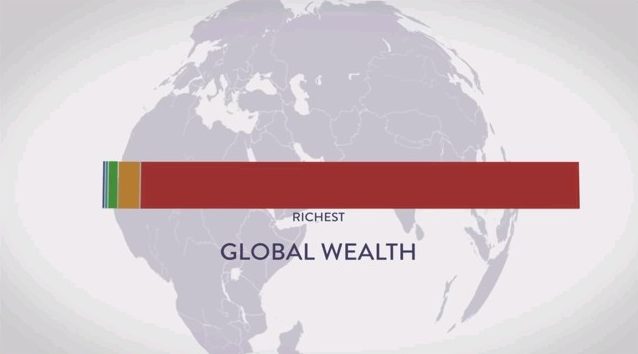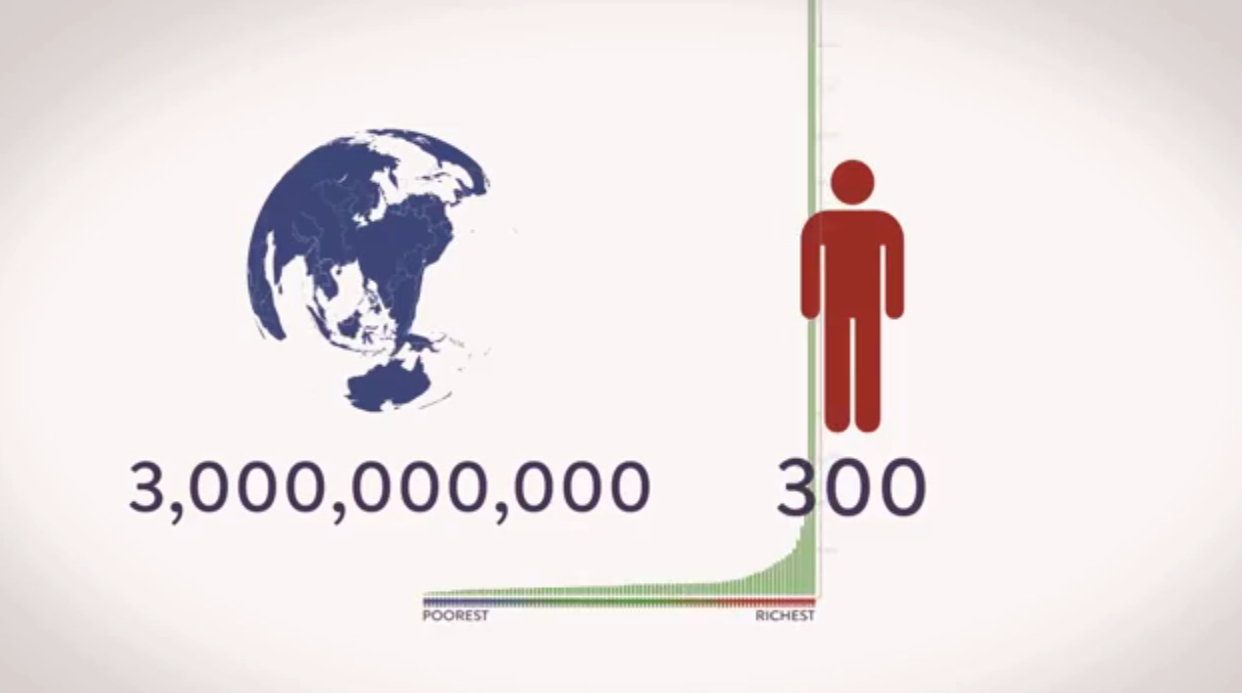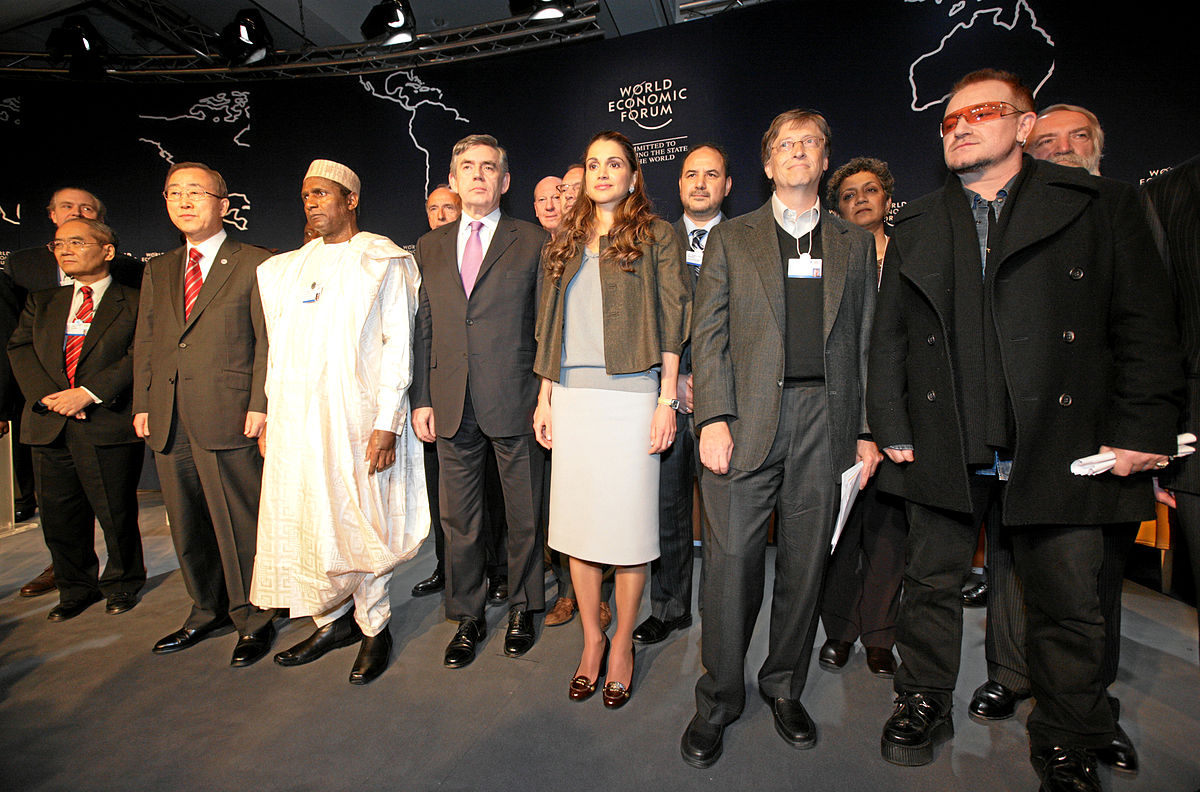
Have you eaten today? If not was it because you chose not to or because you didn’t have enough money to do so? And if you have, did you have to think carefully about what you could afford, or did you eat whatever you fancied?
Whoever we are, and however much money we do or don’t have, a lot of the time we’re so focussed on living our daily lives we (understandably) don’t stop to think about how we’ve got to where we are – whether that’s making difficult choices about how we spend our last few coins, having so much money we don’t know what to do with it, or something in between.
It’s also easy to forget how connected our lives, and our money, really are. We can all get our heads around the idea that if someone takes too much of something, someone else will have less, but when it comes to poverty we’re often told that ‘we’re born into it’, or ‘it’s just the economy’, or ‘the wealth will trickle down’, or ‘we’re just lazy/unlucky/unfortunate’. These are such powerful stories that they’re easy to believe, but they all hide the fact that poverty is created – it doesn’t happen by chance.
Imagine two children – one child grows up in a house that’s warm and dry, with shelves full of books and a fridge full of food; parents who can afford to stay at home and look after them; a private education in a well-resourced school with teachers who love their jobs; and, as an adult, access to loans and internships and connections. Today they live comfortably, with a lifestyle like their parents and children of their own.
The other child grows up in a damp, noisy, busy house, with parents who must work several jobs; education in a school with large classes, little funding and stressed teachers; and, as an adult, no access to loans, financial commitments at home and little help finding work. Today they live in poverty, with a lifestyle like their parents and children of their own.
Imagine two countries – one country fosters innovation and develops its industries; it travels across the world to trade with other civilisations; it manufactures weapons which it sells to others; it forces millions of people from other lands to leave their families, jobs and lives to work for them in slavery; it divides up continents and groups of people and rules over them – creating new countries where citizens must work power the empire’s economy; its companies take billions of dollars of resources from other countries without fair retribution whilst damaging ecosystems; it lends money to other countries with an expectation to be repaid with interest; it teaches its values, religion and worldview and wages war on countries and people who do not play by its rules. Now this country is (largely) economically, politically and societally stable, with a large proportion of its population living comfortably above the poverty line.
The other country fosters innovation and develops its industries; it begins trading with visiting nations from overseas; it buys weapons manufactured there; millions of its people are forced to leave their families, jobs and lives to work abroad in slavery or are killed; its people are divided up into new territories and ruled over by foreign countries and forced to grow crops to power foreign economies; its resources are extracted by multinational corporations from abroad and both produce and profit are sent overseas leaving only environmental devastation; it borrows large sums of money from other nations to try and compensate with so much interest it can never be repaid; its values, religions and worldview are criticised, undermined and systematically destroyed, and it is physically attacked if it doesn’t play by the rules. Now this country is economically, politically and societally unstable, with a large proportion of its population living in poverty and hunger.
There are hundreds of stories, just like these, that show that poverty exists because it is created.
You only have to do the maths… the 85 richest people in the world have the same amount of wealth as the poorest 3 billion. Is that just a coincidence?
Every year 18 times more money leaves poor countries in the global south than trickles into them... and we wonder why they’re poor?
This month, the United Nations’ Sustainable Development Goals are telling us a good-news story, and it’s one we all want to hear – that things are getting better and that if we keep doing things largely in the same way, with charities and technical fixes we can end centuries of global poverty creation by 2030.
Don’t get me wrong, I too would like to end global poverty by 2030, but we think that it’s not going to happen until we start admitting that poverty is created, not a state of nature, spot of bad luck, or a disease that humans can ‘cure’ but don’t ‘create’.
So although we all want to feel good about the world, I’d like to invite you to start finding the gaps in the stories we’re being told about poverty and start asking the BIG questions:
- How is poverty created? # PovertyIsCreated
- Why is growth the only answer? #WhyGrowth
- Who’s developing who? #WhosDevelopingWho
When we’re really honest about what’s going on, then we can look at breaking the creaky, archaic, unfair rules with game-changing and exciting possibilities like updating the money system so that it doesn’t just create debt; moving to a steady-state economy so that it’s in balance with nature; putting limits on the power of big companies so that we can have real democracy; or considering a basic income for everyone so we can spend less time fighting and more time loving, and where both of the children and the citizens of the countries we talked about earlier would share fairer, more equal lives.







Thank you for your wonderful framing of this all important question, I sincerely hope it sparks meaningful dialogue and change. I have eaten well today for this I am grateful, but I live in a country where 1 in four people go to bed hungry having not eaten – a situation that could be far worse if it were not for all the sun and the ability for people to grow there own food and achieve food security outside the increasingly exclusive system, however certain companies from the country you mention have backed the global assault of chemical companies on the global seed supply, buying up all the seed companies to introduce growing number of patented GMO seed varieties and are now stooping so low as to offer seed exchange programs where they exchange heritage seed handed down through generations (doing just fine without biotech) for biotech seed claiming to help these vulnerable people. Today 80% of staple food eaten by the poorest and most vulnerable in South Africa is GMO based with massive royalties and sales of chemicals like glyphosate (nasty pesticide) resulting in large % of food production revenue leaving SA and they say it is all for drought resistance technology features of GMO products but this technology has proven not to work as well as claimed if at all !! So yet another systematic mechanism of deliberate poverty creation! I add to your story this
I wish you all the best in your endeavour!
Thank you for your feedback Warwick – I’m glad that this resonated with you. I agree that sustainable, regenerative and fair/equal farming is really important – and is something that big businesses are trying to pull us away from. It’s why I’m glad that there are organisations out there like Food Sovereignty Ghana (http://foodsovereigntyghana.org/) who are working in Ghana where the effects are felt to challenge their dominance!
Hey! Just wanted to say this was a really eye-opening piece. I’ve come here from watching y’all’s videos on YouTube. The one thing that really got me though, i.e., it was completely new to me, was the ‘who’s developing who?’ statistic. That for every $1 dollar given to the global south in aid, $18 is taken out via indirect means. May I ask for your source(s)? Also, who is giving the aid in the statistic? The first-world? Thank you all so much!
Hi Jake,
Thanks so much for your feedback and I’m glad you found it raised some questions for you. With regards to the figure that for every $1 that goes into the global south $18 comes out, the sources are all here.
This is a conservative estimate, calculated as follows:
$135 billion in aid (http://www.oecd.org/dac/stats/develop…) vs. $1.8 trillion in tax evasion and avoidance (see below) + $600 billion debt repayments (http://data.worldbank.org/data-catalo…) + $60 billion lost due to TRIPS (http://www.ourworldisnotforsale.org/e…)
Global Financial Integrity calculates that up to $900 billion (http://iff.gfintegrity.org/iff2012/20…) flows out of the developing world into Western accounts each year through trade misinvoicing. But GFI’s figures do not reflect abusive transfer pricing, which the economist Raymond Baker estimates (http://books.google.co.uk/books?id=Wk…) is probably equivalent in scale to trade misinvoicing. So that’s another $900 billion that flows out of the developing world annually.
What makes this figure conservative is that it doesn’t take into account $480 billion in lost potential GDP due to structural adjustment, as this figure isn’t directly comparable, or the $2.7 trillion estimated to be lost due to devaluation of labour in the global South, as these are estimates by one economist Gernot Kohler (http://wsarch.ucr.edu/archive/papers/…), and are around 20 years out of date and difficult to verify.
I hope that this helps to answer your query somewhat! If you need anything else, don’t hesitate to ask. 🙂